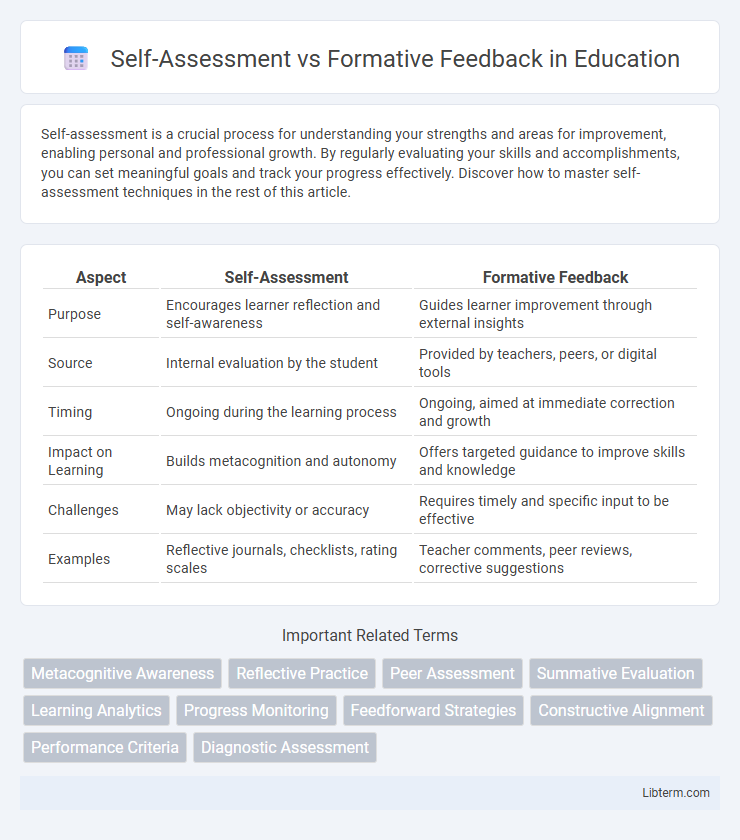Self-assessment is a crucial process for understanding your strengths and areas for improvement, enabling personal and professional growth. By regularly evaluating your skills and accomplishments, you can set meaningful goals and track your progress effectively. Discover how to master self-assessment techniques in the rest of this article.
Table of Comparison
| Aspect | Self-Assessment | Formative Feedback |
|---|---|---|
| Purpose | Encourages learner reflection and self-awareness | Guides learner improvement through external insights |
| Source | Internal evaluation by the student | Provided by teachers, peers, or digital tools |
| Timing | Ongoing during the learning process | Ongoing, aimed at immediate correction and growth |
| Impact on Learning | Builds metacognition and autonomy | Offers targeted guidance to improve skills and knowledge |
| Challenges | May lack objectivity or accuracy | Requires timely and specific input to be effective |
| Examples | Reflective journals, checklists, rating scales | Teacher comments, peer reviews, corrective suggestions |
Understanding Self-Assessment: Definition and Purpose
Self-assessment involves learners actively evaluating their own work and learning progress, fostering critical thinking and metacognitive skills. It encourages students to identify strengths and areas for improvement, promoting personal responsibility in the educational process. The primary purpose of self-assessment is to enhance self-awareness and guide goal-setting for continuous learning advancement.
What is Formative Feedback? Key Concepts Explained
Formative feedback is an ongoing process where educators provide specific, actionable guidance to learners during the learning journey, aiming to improve understanding and performance before final evaluation. Key concepts include timely intervention, clear criteria alignment, and constructive suggestions that help students identify strengths and areas for growth. This dynamic interaction fosters a growth mindset, encouraging continuous improvement and deeper engagement with the material.
The Role of Self-Assessment in Learning
Self-assessment plays a crucial role in learning by encouraging learners to actively reflect on their understanding and identify gaps in knowledge, fostering deeper cognitive engagement. This process promotes metacognitive skills, enabling students to regulate their own learning strategies and set personalized goals. Compared to formative feedback, self-assessment cultivates intrinsic motivation and autonomy, empowering learners to take ownership of their educational progress.
How Formative Feedback Enhances Student Progress
Formative feedback provides continuous, specific insights that target students' strengths and areas for improvement, fostering deeper understanding and skill development. This real-time guidance enables learners to adjust their strategies and approaches before final assessments, promoting incremental progress. Compared to self-assessment, formative feedback delivers expert perspectives that clarify expectations and enhance motivation for sustained academic growth.
Benefits of Self-Assessment vs Formative Feedback
Self-assessment enhances learners' metacognitive skills by promoting self-awareness and responsibility for their own progress, leading to deeper understanding and intrinsic motivation. Formative feedback provides targeted, expert insights that help identify specific areas for improvement, accelerating skill development and knowledge retention. Combining self-assessment with formative feedback maximizes learning efficiency by balancing self-reflection with external guidance.
Common Challenges in Implementing Self-Assessment
Common challenges in implementing self-assessment include students' limited ability to accurately evaluate their own work, often due to lack of experience or understanding of assessment criteria. Educators struggle with ensuring consistency and reliability in self-assessment outcomes, which can impact the effectiveness of formative feedback. Resistance from students and teachers, coupled with insufficient training on self-assessment techniques, further complicates its integration into learning environments.
Effective Strategies for Delivering Formative Feedback
Effective strategies for delivering formative feedback include providing specific, actionable comments that guide learners toward improvement while maintaining a positive tone to foster motivation. Utilizing timely feedback during the learning process allows students to reflect on their performance and adjust strategies before final assessments. Incorporating self-assessment techniques alongside teacher feedback encourages deeper metacognitive awareness and helps learners identify their strengths and areas for growth.
Comparing Self-Assessment and Formative Feedback in Practice
Self-assessment enables learners to evaluate their own understanding and skills, promoting metacognition and personal responsibility in learning. Formative feedback, provided by instructors or peers, offers targeted guidance and corrective suggestions to improve performance during the learning process. Combining both strategies enhances learner engagement and supports continuous improvement by balancing self-reflection with external insights.
Best Practices for Integrating Both Approaches
Integrating self-assessment with formative feedback enhances student learning by promoting reflection and providing targeted guidance. Best practices include aligning self-assessment criteria with clear learning objectives to ensure meaningful student evaluation and using formative feedback to address gaps identified during self-assessment. Combining these approaches fosters metacognitive skills and supports continuous improvement through iterative cycles of reflection and instructor input.
Future Trends: The Evolving Role of Feedback in Education
Future trends in education emphasize the integration of self-assessment with formative feedback to create personalized learning experiences that adapt to individual student needs. Advances in artificial intelligence and learning analytics enable real-time, targeted feedback, enhancing student engagement and promoting lifelong learning skills. The evolving role of feedback is shifting from purely instructor-driven evaluation toward a collaborative process fostering self-regulation and continuous improvement.
Self-Assessment Infographic

 libterm.com
libterm.com